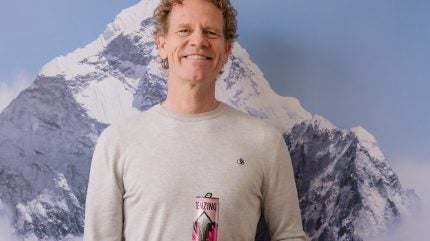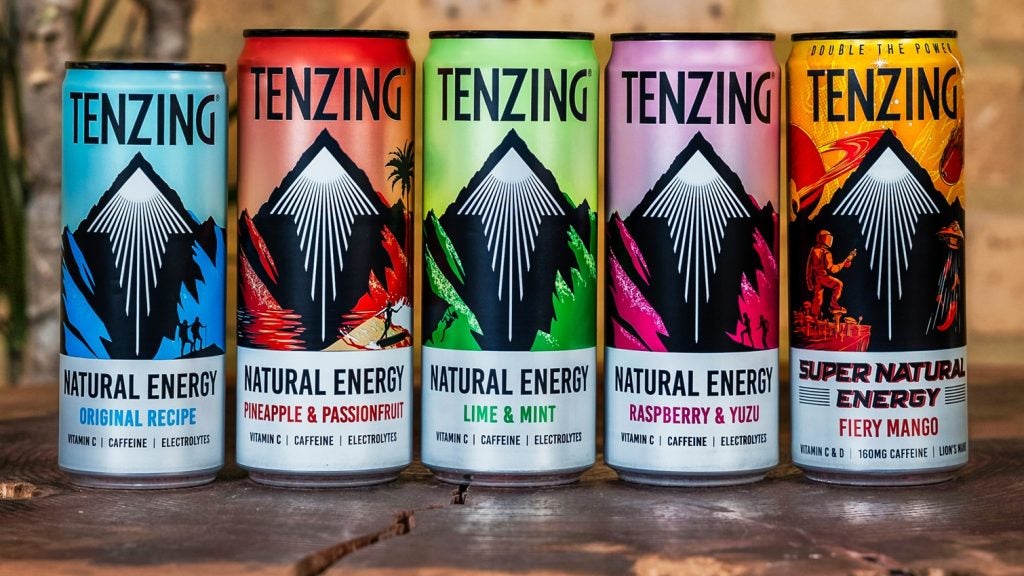
Tenzing, the UK ‘natural’ energy-drink business, has sold a minority stake to Heineken, the Dutch brewing giant’s latest move to building its interests outside beer through investing in up-and-coming firms.
For London-based Tenzing, the deal will help the company grow in a sought-after part of its home market – convenience stores – and give it more muscle to investment in marketing as it competes with the likes of Red Bull and Monster.

Discover B2B Marketing That Performs
Combine business intelligence and editorial excellence to reach engaged professionals across 36 leading media platforms.
Just Drinks sat down with Tenzing co-founder – and former Red Bull executive – Huib van Bockel to discuss Heineken’s investment, how the two companies will work together and demand for ‘functional’ energy drinks.
Dean Best (DB): Is this first outside investment you’ve taken on?
Huib van Bockel (HVB): We had one investment round back in 2018 but we actually bought those out again.
DB: What level of interest did you have this time around?
HVB: We spoke to basically the whole lot, I think. Energy is a sought-after space. It’s a huge market, nearly £3bn ($4bn) turnover, I think, in the UK alone. It’s a profitable business, a profitable category. It’s fast-growing and it’s hard to get into, right? We’re the only independent brand in the top ten and have reached that number three spot in London grocery and in Tesco. We did have a lot of interest but, for us, it was really about finding that right partner, so we took our time to make sure that we found the right one.
DB: Did you have any firm offers apart from Heineken?
HVB: Yes. We had a couple.

US Tariffs are shifting - will you react or anticipate?
Don’t let policy changes catch you off guard. Stay proactive with real-time data and expert analysis.
By GlobalDataDB: What was it about Heineken’s offer and its attributes that made you decide to team up with them?
HVB: Obviously, we go quite against the big dogs, you know, and artificial sweeteners, or high sugar levels. A player like Heineken, they’re talking about they’re only in natural ingredients, crafting their products. They brew it all themselves. That was one thing I liked about it. I didn’t have to worry that I had an investor on-board that minded me bashing an artificial sweetener. They believe in pure and good products.
Secondly, they’re brand-building around communities. We’re really a community-focused business around climbing and bouldering, running. They’re also big brand builders. Third is they think long term. Obviously, it is on the stock exchange as well but it is a family business and they really think long term. Especially, I thought if you compare that, let’s say, to the VC model, where it’s really kind of squeezing everything out to maximise the value. This is really building a brand in the long run, which I liked. Fourthly, it’s also about a rapport. Do you get along with everyone? And I thought the teams are great. They believed in the brand and we just got along really well.
DB: What size stake in Tenzing have Heineken acquired?
HVB: It’s a significant minority stake. Higher than 25%.

DB: Will it mean any changes to your manufacturing or distribution?
HVB: We will operate totally independently. We’re still an independent business. The one area where it will have the most impact is in the convenience channel. They will really support us in our distribution there. It is extremely hard for an independent, smaller scale-up as we are to reach all those 45,000 independent stores. That is the main difference.
From a strategy perspective, they believed in our mission to change the energy-drinks industry for good, to have a natural, plant-based and sustainable [option]. That vision is not changing. It’s just more we will now double down on that, really push that. The funds that came will move into proper marketing spend. We’re going to start our biggest campaign that we have done on 19 May and we have a set-up that allows us to keep advertising our brand, really pushing our brand, for the next couple of couple of years. The main thing is fuel on the fire on the marketing side, on the brand side and our community side and then, at the same time, help us with the distribution in the hardest channel.
DB: Is that the convenience channel in the UK specifically, or your other markets, too?
HVB: No, just the UK to start off with, because we are already in every retailer with all the grocers. I’m pretty sure energy drinks is now the biggest category in convenience. It’s a space that we weren’t operating in yet, or hardly. That is the biggest win. Then we have a longer-term plan where we focus on the UK first and then look together at what markets we can tackle together after that.
At the end of the day, a better-for-you option is successful in every category
DB: Is demand for cleaner, or ‘functional’ energy drinks in the UK still rising?
HVB: Well, it’s really cool to see we just got the latest Nielsen data in and we are the fastest-growing in the last year to-date as well. We’re only scratching the surface. At the end of the day, a better-for-you option is successful in every category. Look in the US and what’s happened with the likes of Poppi and Olipop.
I always say the same thing. I was at Red Bull before and I knew there was a big worry around two things with energy drinks. First of all, that they are extremely artificial. The artificial sweeteners. Secondly, of course, high sugar and high calories. I just naively thought if you just tackle those two issues, you’ll sell like crazy. But that’s not how it goes. There is deep entrenched habits, right? We test that every year. We say ‘Would you rather buy a natural energizing drink or one made with artificial ingredients?’ About 83% says natural.
In places where we’ve activated well over the last year, for instance, the whole bouldering world and our community in climbing, we are the number one energy drink. In all London universities, we’re the number one energy drink. In WeWork, in Google, in many of these offices, we’re the number one energy drink. Where we focused, we’ve won. That’s what this new backing will allow us to do – do that on a much larger scale.
DB: You’re competing with Red Bull and Monster. They’ve got a lot more promotional muscle distribution muscle.
HVB: One hundred per cent. That’s exactly the reason. To be honest, for a long time, I thought I just wanted to do this alone but, to get that convenience step, which is so important, to get that real distribution level, you need a partner and that’s why Heineken’s perfect for that.
DB: What plans do Tenzing and Heineken have outside the UK for the next 12 months or so?
HVB: We will continue to go in our markets that we’re already operating – Australia, the Netherlands and Switzerland. Then, together with Heineken, have a good look at what other countries could be perfect for us. The focus for the next 12 months is really doubling down on the UK.
DB: You don’t expect to be in any new markets this year?
HVB: This year, for certain, no. We really want to make sure that we stick to the UK. It’s a humongous market. We’re already number three in Tesco and London grocery and just take that and make sure of becoming the number three brand in all of the UK.
DB: What were Tenzing’s sales and net profit in 2024?
HVB: Our retail sales were about £15m. Net profit, we don’t share that but we were profitable in a good way. I don’t want to say the exact number but we were profitable.
DB: What’s your sales target for this year?
HVB: We want to hit that £20m in retail sales. It’s also getting to know each other as partners and then scaling faster this year. We just signed the deal, so half of the year is already done. Are we already on that growth trajectory? Like I said, we are 30% growth at the moment in Nielsen. That’s kind of the growth target, accelerate that a bit and then really start to accelerate that in the year after.
DB: Does Heineken have an option to buy more shares?
HVB: We didn’t disclose anything on the specifics of the deal but all I can say now is they have a minority stake and will help us with the distribution.





